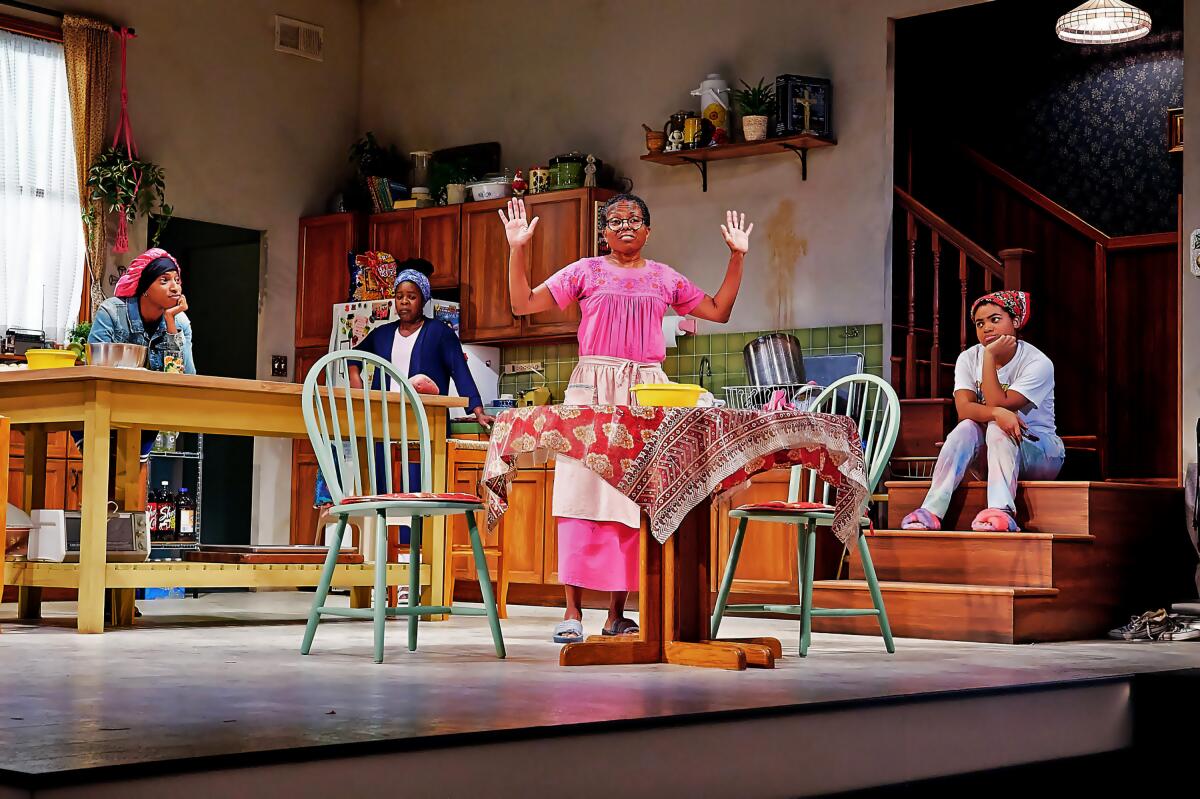Review: A tale of sorrow and survival simmers in Pasadena Playhouse’s ‘Stew’

- Share via
The church meal isn’t the only thing that’s simmering in Mama’s kitchen in “Stew.” Zora Howard’s play, a 2021 finalist for the Pulitzer Prize in drama, now at Pasadena Playhouse through Aug. 6, has its eye on the generational strife perpetually coming to a full boil in a family of Black women.
Mama (LisaGay Hamilton), formidably exacting, stirs the pot and issues stern orders. This is a big day for her — for reasons that are left for us to surmise — and she wants everything to be perfect. Her daughter Lillian (Roslyn Ruff) has made a special trip with her young daughter, Lil’ Mama (Samantha Miller), and son Junior (who doesn’t appear in the play but whose offstage presence is crucial to the story).
Nelly (Jasmine Ashanti), who’s 17 and tied to the phone, lives with Mama. She seems to be her youngest daughter, though Howard steers clear of straightforward exposition, viewing the action through a slightly dreamy filter. Each of the characters has a backstory, but we learn about what’s going on in their lives mostly through their often heated exchanges.
The tension in the kitchen is boisterously unrelenting. Mama, who is allowed the last word, has unspecified health issues. Lillian is having marital woes. Nelly is in the throes of a romance that is redirecting her future. And Lil’ Mama is just trying to stay out of the crossfire.
Howard has written a kitchen-sink drama with a difference. “Stew” is more concerned with pattern than plot. History is tracked in its path of repetition. The everyday sorrows, disappointments and hopes of three generations of Black women are chronicled. So too is their stamina to survive a world of economic hardship, emotional neglect and chronic violence.
The conceptual design of “Stew” may be more compelling than the execution. There’s a static quality to the drama, which is composed of repetitive trains of conversations. The play doesn’t so much develop as erupt. Hints of the tragic ending are discreetly placed, but it’s only in retrospect that the dots are connected.
When Lil’ Mama reveals that she’s auditioning for a part in Shakespeare’s “Richard III,” the discussion that ensues seems tangential. She’s up for the role of a widowed queen, whose children are murdered. Mama, the founder and director emeritus of the Mt. Vernon High Dramatic League and first soloist at the Greater Centennial A.M.E. Zion Church, coaches her to experience the truth of the mother’s lamentation scene. She knows the reality of traumatic loss and wants her granddaughter to understand what her character is going through.
The characters are reflections of each other. Every one of these women is distinct, but their humorous banter and flashes of temper and frustration seem interchangeable because of the generic quality of the dialogue. The effect can be enervating.
The production, directed by Tyler Thomas on a kitchen set designed by Tanya Orellana that looks credible enough to produce a sumptuous buffet, lacks the necessary texture to pull off Howard’s difficult assignment. The actors are all fine on their own, but the play would be more compelling in a more intimate house. (“Stew” would benefit from the supplemental insights that closeups can yield.)
Hamilton, who won an Obie for her unforgettable performance in Athol Fugard’s “Valley Song,” delivers Mama’s dictatorial commands like a woman who has been made to feel that she has no room for error in this world. As Lillian, Ruff brings a soft-spoken courtesy to the family’s clamorous clashes and a heartbreaking vulnerability when relating how her marriage emotionally died. Ashanti’s Nelly is boldly and believably tempestuous. Miller’s Lil’ Mama is convincingly adolescent in her determination to be left alone.
Together, these four women form a composite figure. They are the principal ingredients in a dramatic offering that is more complex than its surface familiarity. Howard tries to break through realistic convention to something more timelessly tragic.
“Stew” ends on an ambiguous note that scrambles temporal reality. What happens is grievous, but the play leaves little doubt about the capacity of Black women to survive.
‘Stew’
Where: Pasadena Playhouse, 39 S. El Molino Ave., Pasadena
When: 8 p.m. Wednesdays to Fridays, 2 and 8 p.m. Saturdays, 2 and 7 p.m. Sundays. Ends Aug. 6
Price: $35 and up
Info: (626) 356-7529 or PasadenaPlayhouse.org
Running time: 1 hour, 30 minutes (no intermission)
More to Read
The biggest entertainment stories
Get our big stories about Hollywood, film, television, music, arts, culture and more right in your inbox as soon as they publish.
You may occasionally receive promotional content from the Los Angeles Times.











